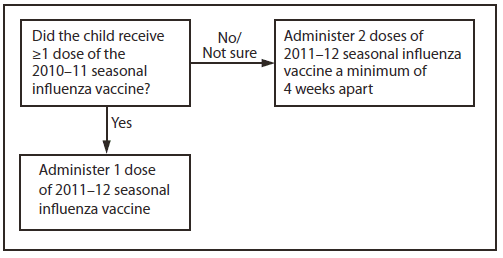# 5764
ACIP, the Advisory Committee on Immunization Practices, issued their recommendations that practically everyone over the age of 6 months receive a yearly flu vaccine back in 2010.
ACIP reinforces that recommendation in today’s release of the CDC’s MMWR providing updated guidance for the approaching flu season.
Prevention and Control of Influenza with Vaccines: Recommendations of the Advisory Committee on Immunization Practices (ACIP), 2011
Early Release
August 18, 2011 / 60(Early Release);1-6
(EXCERPTS)
Vaccine Strains for the 2011--12 Influenza Season
The 2011--12 U.S. seasonal influenza vaccine virus strains are identical to those contained in the 2010--11 vaccine. These include A/California/7/2009 (H1N1)-like, A/Perth/16/2009 (H3N2)-like, and B/Brisbane/60/2008-like antigens. The influenza A (H1N1) vaccine virus strain is derived from a 2009 pandemic influenza A (H1N1) virus (3).
Recommendations for Vaccination
Routine annual influenza vaccination is recommended for all persons aged ≥6 months (1). To permit time for production of protective antibody levels (4,5), vaccination should optimally occur before onset of influenza activity in the community, and providers should offer vaccination as soon as vaccine is available. Vaccination also should continue to be offered throughout the influenza season.
Although influenza vaccine strains for the 2011--12 season are unchanged from those of 2010--11, annual vaccination is recommended even for those who received the vaccine for the previous season. Although in one study of children vaccinated against A/Hong Kong/68 (H3N2) virus, vaccine efficacy remained high against this strain 3 years later, the estimated efficacy of vaccine decreased over the seasons studied (6). Moreover, several studies have demonstrated that postvaccination antibody titers decline over the course of a year (7--10). Thus, annual vaccination is recommended for optimal protection against influenza.
Vaccine Doses for Children Aged 6 Months Through 8 Years
Children aged 6 months through 8 years require 2 doses of influenza vaccine (administered a minimum of 4 weeks apart) during their first season of vaccination to optimize immune response. In a study of children aged 5 through 8 years who received trivalent inactivated vaccine (TIV) for the first time, the proportion of children with protective antibody responses was significantly higher after 2 doses than after 1 dose (11).

FIGURE 1. Influenza vaccine dosing algorithm for children aged 6 months through 8 years --- Advisory Committee on Immunization Practices (ACIP), 2011--12 influenza season
This ACIP release also focuses on those with egg allergies, who in the past have been advised against taking the flu vaccine.
Recent studies have indicated that many with mild to moderate allergies to eggs can safely take the flu vaccine, and so this release offers the following recommendations.
Recommendations Regarding Persons with Egg Allergy
Each of the following recommendations applies when considering influenza vaccination of persons who have or report a history of egg allergy.
Persons who have experienced only hives following exposure to egg should receive influenza vaccine with the following additional measures (Figure 2):
a) Because studies published to date involved use of TIV, TIV rather than LAIV should be used.
b) Vaccine should be administered by a health-care provider who is familiar with the potential manifestations of egg allergy.
c) Vaccine recipients should be observed for at least 30 minutes for signs of a reaction following administration of each vaccine dose.
Other measures, such as dividing and administering the vaccine by a two-step approach and skin testing with vaccine, are not necessary.Persons who report having had reactions to egg involving angioedema, respiratory distress, lightheadedness, or recurrent emesis, or persons who required epinephrine or other emergency medical intervention, particularly those that occurred immediately or within minutes to hours after egg exposure are more likely to have a serious systemic or anaphylactic reaction upon reexposure to egg proteins. Before receipt of vaccine, such persons should be referred to a physician with expertise in the management of allergic conditions for further risk assessment (Figure 2).
All vaccines should be administered in settings in which personnel and equipment for rapid recognition and treatment of anaphylaxis are available. ACIP recommends that all vaccination providers be familiar with the office emergency plan (18).
Some persons who report allergy to egg might not be egg allergic. Those who are able to eat lightly cooked egg (e.g., scrambled eggs) without reaction are unlikely to be allergic. Conversely, egg-allergic persons might tolerate egg in baked products (e.g., bread or cake); tolerance to egg-containing foods does not exclude the possibility of egg allergy (35). Egg allergy can be confirmed by a consistent medical history of adverse reactions to eggs and egg-containing foods, plus skin and/or blood testing for immunoglobulin E antibodies to egg proteins.
A previous severe allergic reaction to influenza vaccine, regardless of the component suspected to be responsible for the reaction, is a contraindication to receipt of influenza vaccine.
Related Post:
Widget by [ Iptek-4u ]